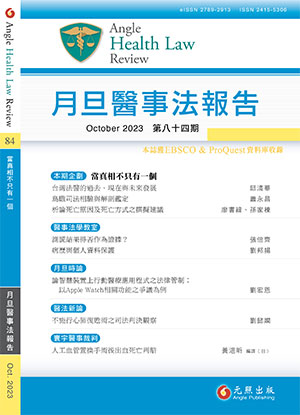嚴重特殊傳染性肺炎的疫苗責任:風險-效益之辯證(三)【全球瞭望】 試閱
Vaccine Liability in the Light of COVID-19: A Defence of Risk–Benefit (III)
在20和21世紀,疫苗在推動醫學治療上扮演了至關重要的角色。然而,沒有任何醫療介入措施是毫無風險的,疫苗也不例外。本文將著重於英國、歐盟與美國之經驗,探究律師在判定疫苗責任缺陷的情境下如何面對或迴避風險-效益,並探討風險-效益在評估COVID-19疫苗責任時所發揮的潛在作用。文中認為,在確認疫苗的缺陷性時,採用一種具有整體性、彈性的方法、涵蓋風險-效益分析,有助於評估由持續提供和供應疫苗所帶來的巨大公共利益,以及對個人和社區提供的免疫效益。如果確實出現有關COVID-19疫苗責任的案例,那麼COVID-19疫苗對個人和社區的免疫效益應該與確定缺陷性有關。此種針對缺陷性而具有整體性、彈性且涵蓋風險-效益分析的方法,可以有效地用於確定疫苗的安全性,並有助於減輕公眾對疫苗接種信心減弱所帶來的危險。
Vaccines have played an essential role in advancing medical treatment in the twentieth and twenty-first centuries. However, no medical intervention is risk free, and vaccines are no exception to that rule. This article considers how lawyers have confronted or eschewed risk–benefit in the context of determining defectiveness in vaccine liability, with emphasis on the UK, European Union, and US experiences. It explores the potential role that risk–benefit may play in assessing liability for vaccines against the COVID-19 pandemic. It argues that a holistic, flexible approach to determining defectiveness embracing risk–benefit allows consideration of the overwhelming public interest derived from the continued availability and supply of vaccines, as well as immunity conferring benefits on both the individual and the community. If cases do emerge concerning the liability of a COVID-19 vaccine, immunity conferring benefits on both the individual and the community of the COVID-19 vaccines should be relevant in any determination of defectiveness. Such a holistic, flexible approach to defectiveness embracing risk–benefit can be used effectively to determine the entitled safety of a vaccine and may help to mitigate against the dangers of weakening confidence in the public’s vaccine uptake.
063-076






